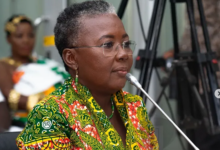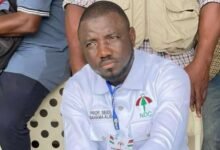President launches sewerage facility, treatment plant at Ashaiman
The President, Nana Addo Dankwa Akufo-Addo, on Wednesday inaugurated ultra-modern Simplified Sewerage Facility and Treatment Plant at Ashaiman, and the rehabilitated and expanded Bankuman Simplified Sewerage Plant.
The two new sewerage networks, comprise about 51 kilometers of sewer lines, and a new wastewater treatment plant with a capacity of about 1,800m3 cubic meters a day in Ashaiman, to some 4,805 households in the community.
The plant in Bankuman, with a capacity of 1,600 cubic meters a day would also serve some 3,100 households.
Speaking at the ceremony, held at Ashaiman, President Akufo-Addo noted that the two projects were constructed at a cost of $6.6 million.
He said the decision to construct and rehabilitate the plants reinforced his government’s commitment to offer solutions to the infrastructural gap identified as one of the major challenges plaguing the sanitation and water resources sector.
“The projects being commissioned today are examples of the many sanitation projects that have been provided across the country. This magnificent simplified sewerage system, as well as the rehabilitated Bankuman project, will inure to the benefit of the people living within the catchment areas of Ashaiman and Bankuman communities of Greater Accra,” he emphasised.
Under the Greater Accra Metropolitan Area (GAMA) Sanitation and Water Project, conceived as one of the pro-poor interventions to ensure the policy of “One-House-One-Toilet” is delivered across the Metropolitan Area, he stated that the Project has delivered some 48,641 improved household toilets, which have benefitted some 389,128 people as at December 2020.
In addition to this, 406 improved and modern disability-friendly, gender sensitive institutional toilet facilities, benefiting some 251,872 school children has been completed, as at December 2020.
“The GAMA Project has been so successfully executed that additional financing was sought and obtained from the World Bank to extend the intervention to the Greater Kumasi Metropolitan Area,” he said.
President Akufo-Addo said the project in Kumasi would also expand and rehabilitate the 29-year-old Asafo sewerage system in Kumasi, provide an additional 12,000 household toilets and 30 institutional toilets in the Greater Kumasi Metropolitan Area.
He explained that component one of the Greater Kumasi Project would extend potable water through the laying of 120 kilometres of pipelines, and provision of 5,000 new service connections and also establish a telemetry, and also retool the Ghana Water Company’s metre shop to reduce non-revenue water.
President Akufo-Addo said the government was in partnership with other key stakeholders and the private sector for support in providing these vital services.
“I urge all of us to help sustain and improve the gains made so far by maintaining healthy environmental sanitation, protecting our water bodies and supporting the Clean Ghana Campaign,” he added.
Nana Akuffo-Addo stated that sanitation and water were his priorities and remained the wish of government to improve quality healthcare in urban, peri-urban and rural areas in the country.
These interventions, according to him, had contributed significantly to a drop in open defecation in the Greater Accra region and this was corroborated by the 2021 population census report.
Minister of Sanitation and Water Resources, Dr Freda Prempeh, on her part stated that the Ashaiman treatment system covered 23.9 kilometers condominial and street sewer network with treatment capacity of 1, 800m3 per day to facilitate 5,455 household connections in the Ashaiman New Town and households connections in the Tema Development Corporation Quarters serving a total of 26,718 low income beneficiaries of Ashaiman New Town and TDC Quarters in the Ashaiman municipality.
A representative of the World Bank lauded government commitment in improving water and sanitation challenges in the country.
She said the accelerated development of water and sanitation projects in the country would go a long way in improving healthcare needs in the country.
FROM IAN MOTEY, CLIFF EKUFUL & KEN AFEDZI, ASHAIMAN







